Key takeaways:
- Artisanal baking emphasizes quality, creativity, and mindfulness, standing apart from mass-produced bread through a hands-on process.
- This baking style fosters community connections, allowing bakers to share their stories and engage intimately with consumers.
- Utilizing whole grains and traditional methods highlights health benefits and supports local economies, reinforcing a sense of authenticity in food.
- Personal experiences in baking emphasize the importance of patience, balance, and being open to constructive feedback for growth.
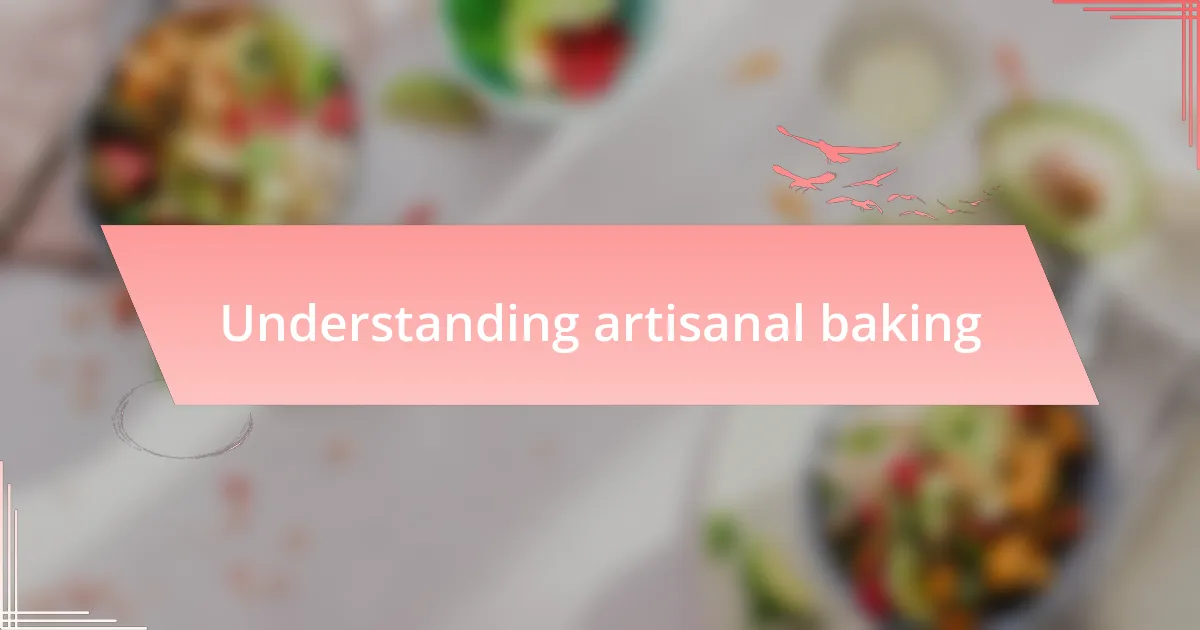
Understanding artisanal baking
When I think about artisanal baking, I picture the hands-on, heartfelt process that transforms simple ingredients into something truly special. Unlike mass-produced bread, artisanal creations often emphasize quality, using traditional methods that highlight the craft and creativity of the baker. Have you ever tasted a loaf that had a slight sourness balanced by the sweetness of fresh grains? That’s the magic of letting dough ferment naturally, allowing flavors to develop over time.
What sets artisanal baking apart is the care that each loaf receives. Each step, from kneading to shaping, is a moment of mindfulness. I recall the first time I shaped a baguette. It felt like sculpting a piece of art, and the sense of accomplishment when I took it out of the oven was exhilarating. It’s not just about baking; it’s about creating something that brings joy to others.
The beauty of artisanal baking lies in its connection to the community. I frequently visit local markets, where bakers proudly share their stories behind each product. When I ask about the inspiration for their unique recipes, their eyes light up. Do you feel that same sense of pride in your work? This connection fosters a shared appreciation for the craftsmanship that goes into every bite, making each loaf a celebratory experience rather than just a necessity.
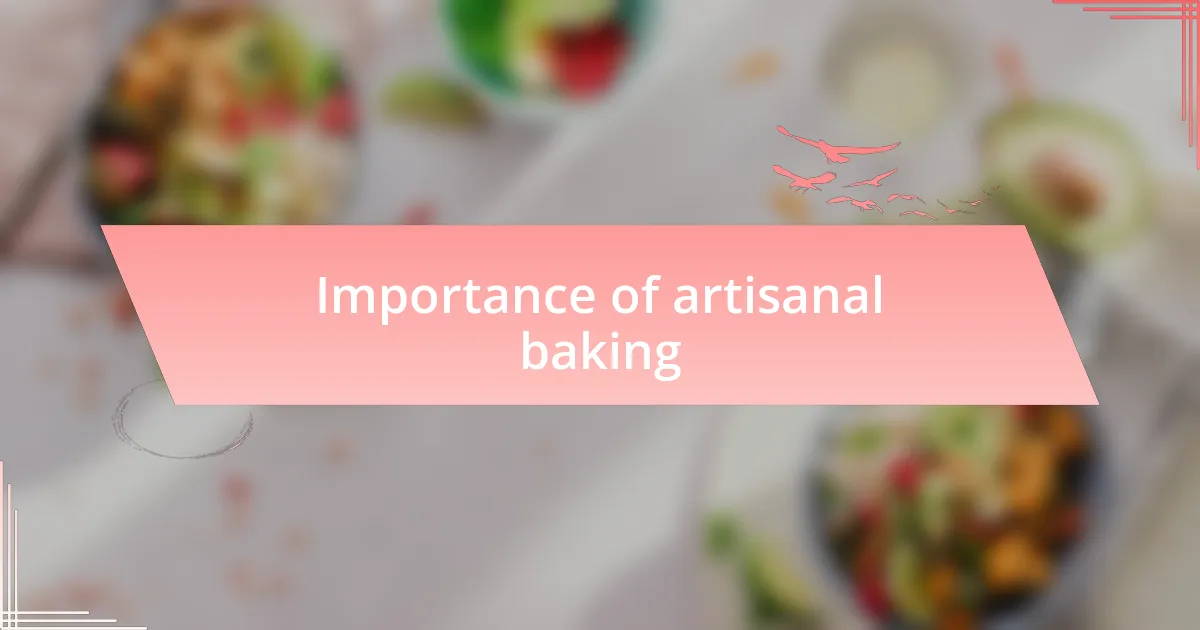
Importance of artisanal baking
Artisanal baking holds a significant place in today’s culinary landscape because it champions not just flavor, but also health. I remember the first time I learned about the benefits of using whole grains instead of refined flour. The difference in taste and nutrition was staggering! Choosing these quality ingredients allows bakers to offer products that are not only delicious but also nourishing, appealing to health-conscious consumers who crave authenticity in their food.
Moreover, the process of artisanal baking fosters a unique relationship between the baker and the consumer. I often think about the warm exchange at the local bakery counter, where I not only receive a beautiful loaf but also a story about its creation. Isn’t it amazing how a simple piece of bread can carry the narrative of the baker’s passion and skill? This personalized touch creates a deep connection that mass-produced items simply can’t replicate.
Finally, the rise of artisanal baking supports local economies by encouraging people to buy from small-scale suppliers. When I choose to purchase from a nearby bakery, I feel like I’m not just taking home a product but also investing in my community. Does it surprise you how something as simple as a loaf of bread can help bolster local businesses? It’s powerful to think that with each purchase, I contribute to a network of artisans who are preserving traditional methods while inspiring future generations of bakers.
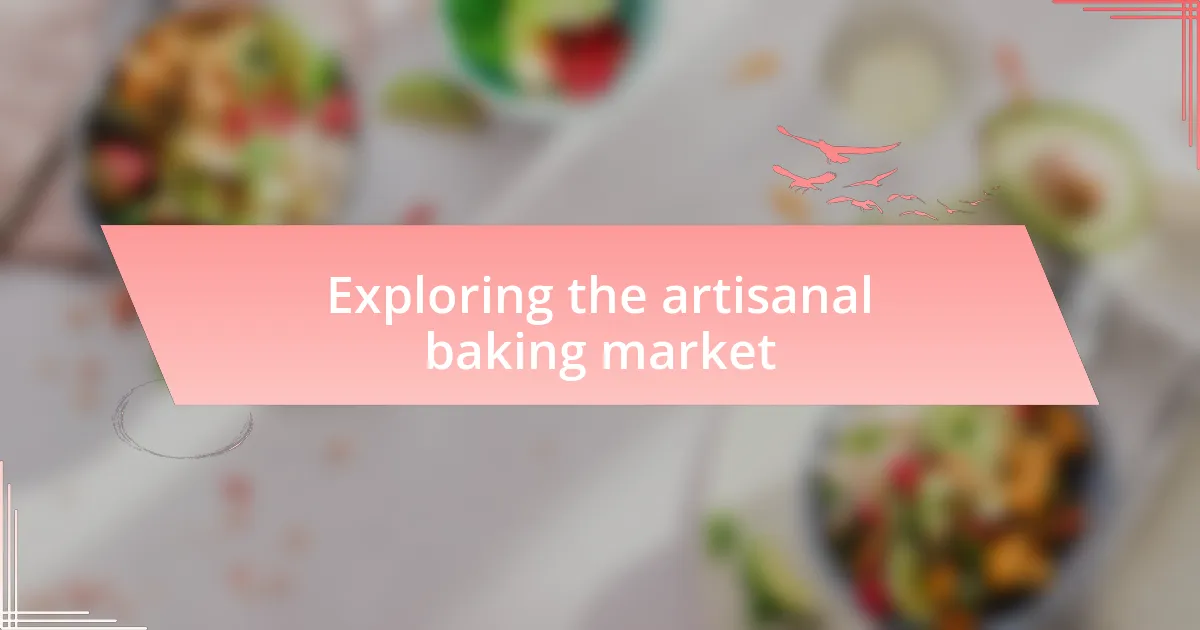
Exploring the artisanal baking market
The artisanal baking market is thriving, driven by a growing consumer desire for quality over quantity. I vividly recall a farmer’s market where I encountered a vendor who used ancient grains. The moment I tasted that rustic loaf, it was clear that these ingredients brought a depth of flavor that was unparalleled. Have you ever felt that rush of excitement when you discover something truly special at a market? It’s these moments that keep customers returning for more.
This market is not just about bread; it’s about community and connection. I find it fascinating how artisanal bakers often collaborate with local farmers, creating an ecosystem that supports sustainability. I remember visiting a bakery where the owner shared stories of the local grains they sourced. It made me appreciate the effort that goes into each bite. Isn’t it inspiring how these bakers are redefining our relationship with food, emphasizing transparency in sourcing?
Furthermore, the artisanal baking trend has attracted a younger demographic eager to embrace culinary craftsmanship. I’ve noticed more workshops popping up, offering hands-on experiences that allow participants to connect with the art of baking. It’s heartwarming to see individuals gather to learn, share, and savor their creations. Isn’t it uplifting to see new generations passionate about skills that have been passed down through ages?
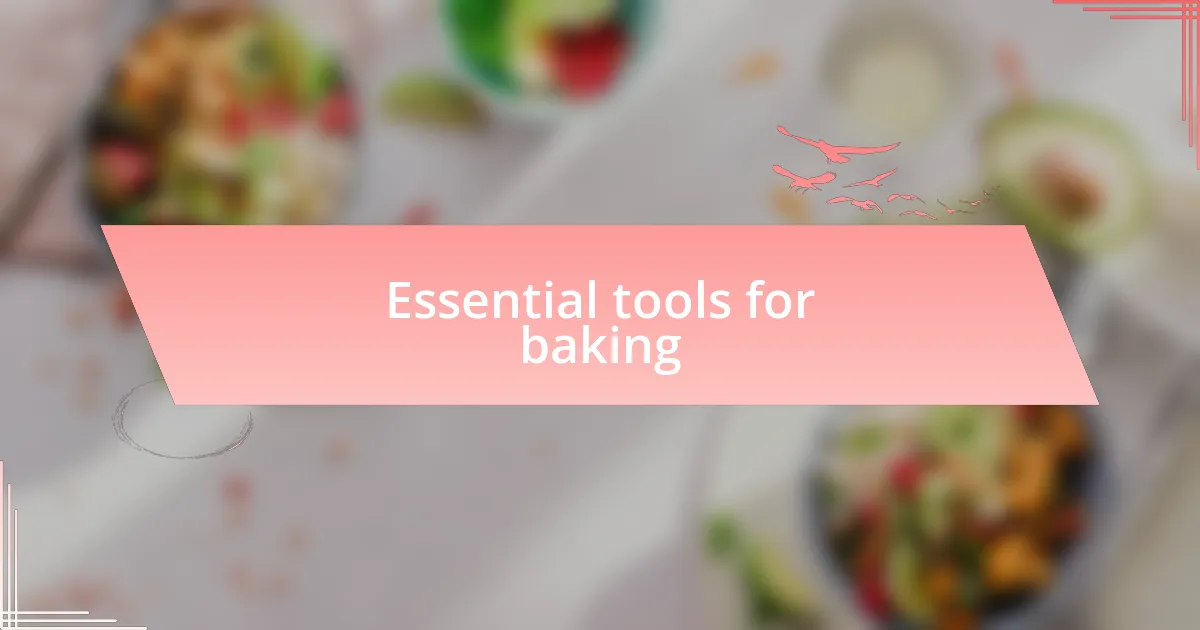
Essential tools for baking
When diving into artisanal baking, having the right tools is crucial for success. A good quality kitchen scale has transformed my baking experience; measuring ingredients by weight ensures accuracy and consistency. I remember my early days of baking when I would rely on cups, often leading to disappointing results. Have you ever wondered how professional bakers achieve such precision?
Another indispensable tool is the bench scraper. This simple yet versatile instrument has become my best friend in the kitchen. Whether I’m cutting dough or cleaning my work surface, it makes the process smoother and more efficient. It’s interesting how a tool as straightforward as this can elevate your baking game, don’t you think? It’s those little things that make a significant difference.
Lastly, investing in a quality mixing bowl—specifically, one that’s sturdy and easy to handle—can be a game-changer. I recall a baking session where my cheap bowl slipped out of my hands while mixing, sending dough flying everywhere. There’s something comforting about a well-crafted bowl that feels solid and reliable. Have you ever felt that sense of security with a tool that just works? Each of these essential tools not only enhances the baking process but also invites joy and creativity into the kitchen.
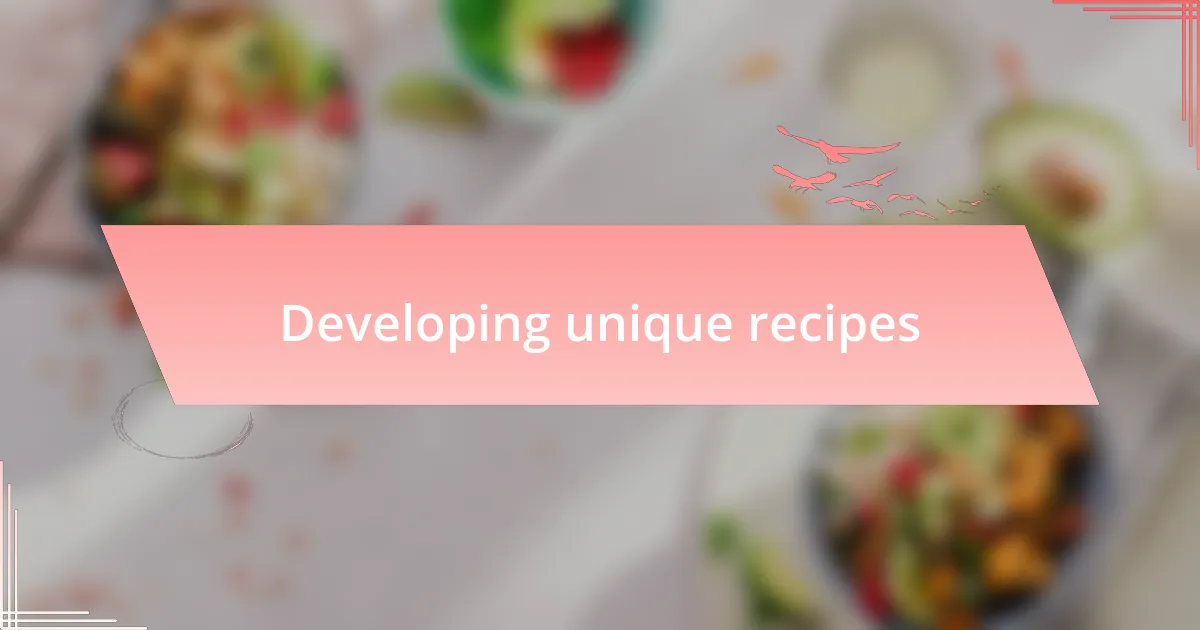
Developing unique recipes
Developing unique recipes is where the magic of artisanal baking truly shines. I often find inspiration in seasonal ingredients, which leads me to experiment with flavors that reflect the time of year. For instance, during a recent fall season, I played with spices like nutmeg and cinnamon in a bread recipe, evoking the warmth and comfort of autumn. Don’t you think it’s fascinating how a single ingredient can truly transform a dish?
Sometimes, I like to take a traditional recipe and add a personal twist. After a visit to a local market where I discovered an unusual herb, I decided to incorporate it into my focaccia. The result was a surprisingly delightful combination that my friends couldn’t stop raving about. It’s these moments of culinary exploration that keep things exciting. Have you ever taken a leap of faith with an unconventional ingredient?
I usually take notes during my baking experiments, documenting what works and what doesn’t. This practice has been invaluable for refining my recipes over time. One such note came after I learned not to skimp on fermentation; allowing the dough to rise longer yielded a crust that was better than anything I had ever baked before. Have you ever had a baking mishap turn into a valuable lesson? Each recipe I craft tells a story, and I love that they continue to evolve with each new batch I create.

Marketing your baking business
Marketing your baking business requires a blend of creativity and strategy. One method I find particularly effective is establishing a strong social media presence. When I first began sharing my baked goods on Instagram, I was amazed at how a few beautifully styled photos could attract new customers. It’s like a digital storefront that continuously showcases my passion and craft. Have you thought about how visuals can tell your story?
Engaging with the community is another powerful marketing tool. I once organized a pop-up event at a local farmer’s market. The energy was electric! Not only did I sell a good number of loaves, but I also connected with fellow bakers and food enthusiasts. Sharing my journey with people face-to-face allowed me to build genuine relationships. Do you think local events could elevate your brand visibility?
Lastly, I believe that storytelling in your marketing materials can create an emotional connection with customers. When I share the inspiration behind my recipes or the challenges I overcame, it resonates with people on a personal level. Just the other day, I received a message from someone who was touched by my story of learning to bake during difficult times. This connection can turn casual buyers into loyal fans. Have you shared your baking journey with those around you?
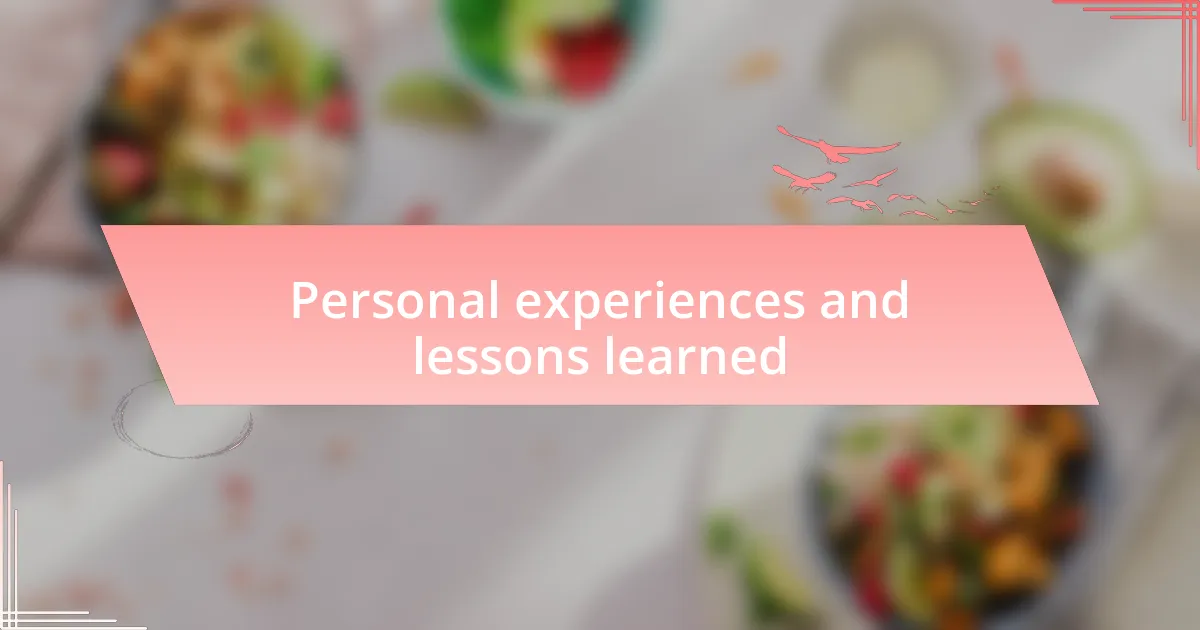
Personal experiences and lessons learned
As I delved into the world of artisanal baking, I learned early on that patience is key. I remember the first time I attempted sourdough. The dough was inexplicably sticky, and instead of despairing, I opted to embrace the process. By allowing it to rest longer, I discovered that working with dough requires as much time as it does technique. Have you ever underestimated the importance of patience in your own culinary ventures?
Another lesson came during a challenging holiday season when my sales spiked unexpectedly. I felt overwhelmed, leading to a few late-night baking sessions that lacked my usual attention to detail. I quickly realized that stress doesn’t mix well with creativity. That experience taught me the importance of balance and self-care. How often do we forget to prioritize our well-being amid the hustle?
Lastly, I found that feedback is a double-edged sword. During my early days, I shared samples with friends who offered both praise and criticism. Initially, it stung a little, especially when they pointed out areas for improvement. However, over time, I understood that constructive criticism is invaluable. It’s an opportunity for growth and helps refine my craft. How has feedback shaped your journey, and are you open to embracing it?